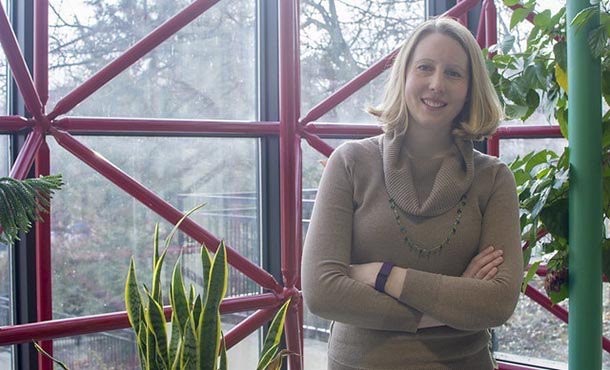
Jacqueline O’Connor, associate professor of mechanical engineering at Penn State and the inaugaral director of the Center for Gas Turbine Research, Education, and Outreach. IMAGE: PENN STATE
Professor to lead Center for Gas Turbine Research, Education, and Outreach
Mechanical engineering's Jacqueline O'Connor plans to advance the historic strengths of the University while pioneering new high-impact, interdisciplinary avenues of research
2/18/2020
By Erin Cassidy Hendrick
UNIVERSITY PARK, Pa. — Jacqueline O’Connor, associate professor of mechanical engineering at Penn State, will lead the newly created Center for Gas Turbine Research, Education, and Outreach.
Gas turbines play a critical role in energy production, with an estimated one-third of the United States’ power being produced by these engines every year. In addition, the U.S. Energy Information Administration projects that roughly 60% of the energy generation until 2035 will be fueled by combined cycle gas turbine plants.
“Gas turbines have huge impacts both economically and from a quality of life standpoint,” O’Connor said. “They’re extraordinarily important to the world.”
Historically, Penn State has demonstrated strengths in both the breadth and depth of research activities advancing gas turbines, including fields of turbomachinery, combustion, heat transfer, manufacturing, materials, acoustics and controls.
“If you showed me a picture of a gas turbine engine, I could show you where, from the front to the very back of that engine and every component in between, we conduct research at Penn State,” O’Connor said. “We are uniquely positioned with our level of expertise.”
In 2007, Penn State was designated as a Center of Excellence for Pratt and Whitney, an aircraft engine manufacturer. The institutional strength of this research was further bolstered by Solar Turbines Inc., an industrial engine manufacturer, who also named Penn State as their first Center of Excellence in the field.
Through O’Connor’s leadership, the new center will build upon these successes and facilitate collaborations among various units across the University, including mechanical engineering, aerospace engineering, engineering science and mechanics, industrial and manufacturing engineering and the Graduate Program in Acoustics, all housed within the College of Engineering, and energy and mineral engineering and materials science and engineering in the College of Earth and Mineral Sciences, and the Applied Research Laboratory.
“As the center grows, we anticipate becoming even more interdisciplinary and hope to partner with more colleges and units,” she said.
The center can also provide undergraduate and graduate students with unique educational benefits that can help embolden their studies and future careers in energy and transportation technologies.
“The real long-term impact of what we do will come from producing the highest-quality graduates who can make a real impact when they go out in the world,” O’Connor said. “We will also be able to build closer ties with industry partners and federal agencies to maximize our research impact.”
The creation of the Center for Gas Turbine Research, Education, and Outreach provides an enhanced pathway for visibility and collaboration. For example, one of the center’s first major activities will be hosting the Advanced Instrumentation, Diagnostics and Controls for Applications in Turbomachinery (AIDCAT) conference at University Park in May. This event will center on the latest advancements in instrumentation, diagnostics and control for advanced turbines and bring together the international community in a focused technical exchange environment.
The cumulative efforts of the center will also help support Penn State’s goal of becoming the “Energy University” by providing technical expertise to help inform industry leaders and policy makers on the importance of gas turbine technologies.
“Through this center’s work, when people in industry and at other academic institutions think of gas turbines, they’ll think of Penn State,” O’Connor said.



